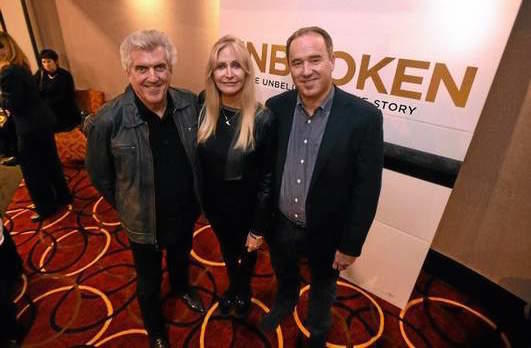Cynthia Garris and Luke Zamperini were both born after World War II and best knew their father after he'd found his faith. They grew up in the Hollywood hills in a house their father bought after he first sold the movie rights to his life story in the 1950s.
That movie never happened and, after Laura Hillenbrand's Unbroken was published in 2011 and Hollywood finally came back around, Louis' adult children were ready to help him make the film he wanted and deserved.
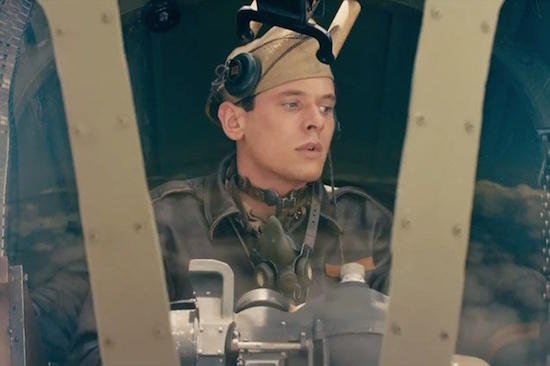
Cynthia, Luke and producer Matt Baer talked about their father and the "Unbroken" movie in New York City at a press day in early December. They're adamant that he endorsed Jolie's approach to his life story and insist that the movie's non-specific portrayal of religious faith was a conscious decision by everyone involved with "Unbroken."
How do you feel about the finished film?
Cynthia Garris: We are over-the-moon happy with the film, with who finally was chosen to direct it, with the job that she did. We knew as children something of the initial film that never came to fruition and then it just kind of vanished. You know we played with our toys, we grew up, we lived our lives, and then the whole question started to be raised again, and we were very hopeful.
Well, first Louis rewrote his autobiography, Devil at My Heels, and that inspired the CBS documentary for the closing ceremonies of the Nagano Olympics. And after that wonderful documentary aired, Hollywood called Louis' home the next day. And then, based on his re-rendering of Devil at My Heels, they started to develop a script and Matt came onboard.
But it wasn’t until Angelina came in and won the film, and she worked hard to get it, that we knew it was going to be a fabulous experience and a fabulous film. We're very happy with it.
Luke Zamperini: I absolutely loved the film. I've been waiting my entire life to see it on the big screen. I'm someone who believes that things happen for a reason and that they happen when they happen for a reason. And although I could never figure out why it wasn’t a film as I was growing up, I'm just so thrilled that it is a film today. It was the right team that put it together. It was the right studio, the right director, the right actors, and I couldn’t be more pleased.
To tell every aspect of my father's life would take about nine hours. So in the time allotted, it was a very good job done to show his determination. As he got into sports, he became a fanatic about the sports and that’s why he was able to set the kind of records that he set.
He didn’t just run for the glory. He ran because he loved to do it. He ran everywhere. He ran on the beach, he ran to the market, he ran all the time and that gave him the ability to become a world class athlete. And being an athlete, every challenge he faced in life was an excuse to train. He was never afraid to face any kind of challenge. He never panicked when he was confronted with any kind of danger. He just figured out a way how to get through it and how to survive. I believe that the film was able to bring that part of his character across.
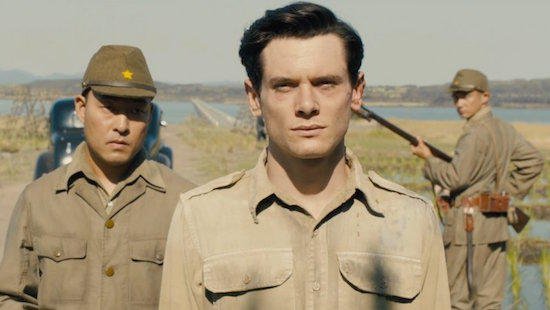
Is the movie missing something because it doesn't include his relationship with Christian evangelist Billy Graham after the war?
Luke: Billy meant a whole lot to my dad. When he met Billy Graham and heard him speak, his life really changed for the better. Billy introduced my father to his Lord and Savior, Jesus Christ, and that is what turned my father's life around finally and completely to a life of service and turned him into the happy, joyful person he was, after going through the post traumatic stress disorder that he went through during and after World War II.
Cynthia: My father was such a wonderful example to me when I was a child. I became a Christian as a child, just by listening to his stories and asking him questions about the Bible. He never forced us to go to Sunday school. He never shoved anything down our throats. He just inspired us with his faith to be people of faith.
He just stayed so true to his faith, unwavering, until the moment he died and went to glory. At times, I just envied how he seemed to look back on his whole life and see the hand of God everywhere, saving him. He almost died at least a hundred times in his life, starting from being two-and-a-half years old and contracting pneumonia. And then he had fallen into an oil well tank. You can't swim in oil and somehow he was miraculously saved from that. The miracles that happened on the life raft with the bullets and the miracle of being freed underwater after being tangled. He could so clearly look back and see that he was saved every single time for a purpose, so that his life had a very clear purpose and meaning.
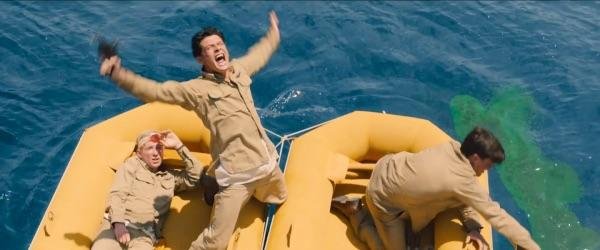
What was it like growing up with Louis Zamperini as your father?
Luke: He was a great dad. He was just fantastic. He was there for us for anything that we were going through. He cooked our meals for us; he bound our wounds. He was just a loving, supportive and a wonderful example.
Cynthia: He loved to have fun. He made me laugh all the time. He loved to pull innocent little pranks.
Our mother had a real cushy life because she got to sleep in every morning. He really, really embraced the whole idea of having a family and caring for them. He would be up early every morning and I would hear the pots and pans clanging in the kitchen, and that would get me up. And he'd be preparing the coffee for him and my mother and getting breakfast ready. That’s when he would like to tease me – my mom and my brother loved to sleep a little bit longer.
He was our hero. If I coughed in the night, it was my dad who would come in and put a Sucrets in my mouth and take my temperature. And if you hurt yourself, got into any kind of trouble, he was the best person to get you out of the trouble, save your life. He saved me from drowning once. And he was obviously really great at first aid.
He could bandage anything. He taught me little things that don’t seem like much, but I remember him putting a Band-Aid on me once and teaching me, if you just hold the sticky parts with your fingers for just a few extra seconds, your body heat will heat that up and it'll stick a lot better. Those are little things that I've remembered my whole life.
Cynthia: I was born in 1949, while he was in the midst of his PTSD. So I was born into a bit of turmoil between him and my mother. He was drinking heavily and, although I don’t have conscious memories because I was just an infant, it really did affect me. I was a little more insecure than my brother, who was born after mom and dad were converted.
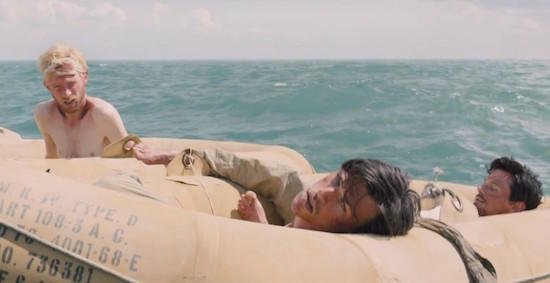
Are there any specific things about Louis' personality that you tried to convey in the film?
Matt Baer: The most important thing that I gained from my 17 years of knowing and working with Lou was that, even with what he had been through, he maintained a sense of humor about everything in his life. He would tease me incessantly in the best and loving ways and he also had a quick wit and such a sharp sense of humor about everything. He also was able, interestingly enough, to continue to pay attention to everything that was going on in the world around him, be it with sports or the children were being raised now versus the way that he was raised. He was so conscious of everything that was going on and with that he was then also able to have humor about what was going on around it.
In terms of the film, obviously there is an intensity to what Lou went through, that you have to balance very carefully. It was part of something that Joel and Ethan Coen brought to the script. Since Joel and Ethan have a remarkable ability with nuance and character, one of the things they added to the film were moments where their sense of humor could come out in a very wise way. For example, when they are captured by the Japanese at sea and they have the side line, “Well, I've got good news and I've got bad news,” right? So just smart. When they are vomiting over the water, it was Joel and Ethan who had Lou say, “Well, we had to try.”
There are lovely moments throughout that are trying to communicate Lou's overall view of life. I can speak as his friend and as the producer of his life story that he was a person who tremendously valued a sense of humor.
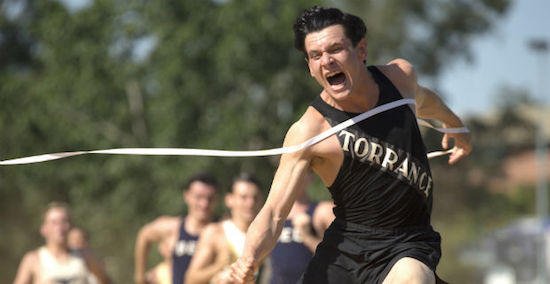
There's a story that your parents were neighbors with Angelina Jolie and Brad Pitt in the Hollywood Hills.
Luke: My mother had a little bit of a movie star crush on Brad Pitt. This was even before the Jennifer Aniston days. She had our dad's old Army binoculars right there on the window sill and she was all the time trying to catch a glimpse of Brad. She could tell us when he was in town because his giant-screen TV would be on. She could never see him, but she could see his TV was on. And she could tell us when he was out of town making a movie because it would be off for weeks and weeks at a time.
As soon as we met Angelina, we could tell she was the right person for the job because she came in with such reverence and respect for my father. We could tell that she was enthusiastic and she had met her hero and she was going to tell his story. We had no doubt from the very beginning.
Cynthia: Luke put her through the wringer a little bit. He did have some tough questions for her. He wanted to know her vision for the film. Luke really needed a little convincing from her and she got a little bit nervous but she gave us her vision and that convinced my baby brother.
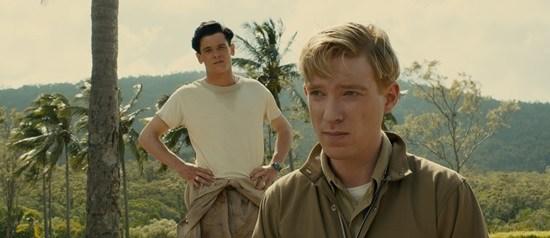
Does Louis' faith play a strong enough role in the finished movie?
Luke: The greatest question in my mind was where are you going to begin to tell the story? The scope of what he went through is too great to tell in two hours. Angelina said, “We can't do the whole story linearly, but we're going to put the various themes through the story itself. That will tell the story.” I was convinced that it was very important that his sense of faith and forgiveness would come out in the film and she guaranteed me that it would and it did.
Matt: One thing that I think is fun to note about the original home is that when Lou sold his life rights to Universal in 1956, it was that check that actually allowed him to buy the home. So there was a wonderful full circle that Universal ended up indeed making the movie.
Luke: One of the most powerful things about the book, and I've heard this from countless people I've talked to, is that it's not a Christian book. It's a book that tells a story of a man and what he went through. The most powerful point of that story is when he finds that he's been spiraling downward in his life and he finds faith and is turned around.
The film beautifully portrays the theme of his faith throughout and, at the end, when you’ve got the tiles that come up and talk about how he found faith and he found a way to forgive his guards. I've talked to people who have seen the film and didn’t read the book and asked, “What did you come away from with that film?” And they said, “Oh, just the power of forgiveness. How can you forgive those guys after looking at what they did to him?”
I think the message is there and it's there in a way that is going to get people to think and to find out for themselves just exactly what this means. And this is the way my father presented the gospel to people in his life. He never shoved it down their throats. He just told the story and let them come up with their own conclusions.
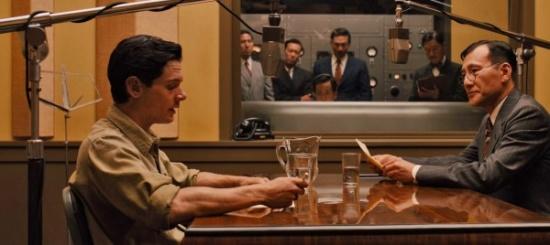
Cynthia: He had a very specific philosophy about this film. If Jesus Christ came up in the film, if that was the message specifically, then it would be a film made for Christians and other people may not want to see it if they're not ready to have that message.
His philosophy was he wanted as many people to come and see the movie as possible. If they loved the movie, they might pick up the book and read more about this extraordinary man and his faith. If they wanted to know more about how he got through it, how he survived it, they can investigate his faith further. That was his philosophy about delivering the message of Christ to people. He never wanted to preach at them. He wanted to live the example and have them come to him and ask, “How did you get through this?”

It was absolutely sanctioned by him. This was what he told us he wanted. Angelina loved him dearly and she wanted to do right by him. Truly, they had a very deep loving connection and she wanted to fulfill this wish.
I want to share something with you because she was not a person of faith. She had never prayed before, but she found herself at the very last scene of the movie, the day of shooting, they needed sunlight to shoot this very important scene. There had been a storm that had been going for a while and she said, “I don’t know what I'm going to do, so I'm gonna do what Louis would do.” She got on her knees and she prayed for a miracle. It stopped raining, the sun came out, a rainbow came out. She said, “Let's get this take.” They shot the take. When she said, “Cut,” it started to rain. She was moved by my father's faith to try that. That’s what he wants for people to get from the movie.
When my father died, we were all with him in a hospital. She came about 45 minutes later and, as we were walking out, she was pointing above and saying, “I know he's with us; I know he's there with God.”
He even moved her. I think in God's plan for Angelina she was supposed to find Louis and make this movie to find her way to a life that would encompass the almighty. She certainly is a great humanitarian and has proven her love for her fellow man over and over again by her acts and her deeds, and I think that maybe it was part of God's plan, that she be a part of his life at this time.

